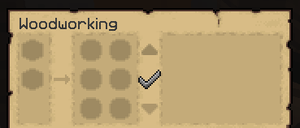Crafting
| Note: This article is a stub. You can help the wiki by expanding it. |
Note: This article is a stub. You can help the wiki by expanding it.
Crafting is a mechanic in Wynncraft that lets players craft Weapons, Armour, Accessories, Food, Potions, and Scrolls.
Overview
Crafting is performed at Crafting Stations located throughout the world map, which are often located within cities or towns. Crafting requires materials and optionally, ingredients and powders.
- Crafting Materials are obtained by gathering raw resources from ores, trees, fish, and crops throughout the world. They correspond to the four Gathering Professions: Mining, Woodcutting, Fishing, and Farming.
- Crafting Ingredients are obtained through killing mobs, opening Loot Chests, completing quests, or purchasing them from merchants. They add Identifications and other effects to the crafted item, usually at the cost of that item's durability or duration.
Both of these types of items can also be obtained from other players by personal trading or can be bought on the Trade Market.
Powders may also be used in crafting. They can only be used in Armouring, Tailoring, Weaponsmithing, Woodworking, and Jeweling, where they apply their effects similarly to as if they were applied through a Powder Master. They reduce the item's durability and, for Tier 3+ powders, increase its skill point requirements. For information on their effects, see here.
Crafted items have a lot of flexibility, and you can adjust every recipe to completely fit whatever you like. Some ingredients and the items crafted with them are also the exclusive source of some identifications in the game, like loot quality, gather XP bonus, and gather speed. Crafted items also have the ability to be very strong. When empowered by high-tier materials, they can outshine regular items.
Mechanics
To craft, you add materials according to the correct recipe and up to 6 ingredients.
You can choose the combat level range of your item, but you can't craft an item with a level higher than your own level in that profession.
Crafting Ingredients can be used if they are able to be used in that profession. Additionally, ingredients' level must be lower than the level of the recipe. (For example, Rotten Flesh can be used in the Lv. 13 to 15 Dagger recipe, but using Pigman Meat in a Lv. 1 to 3 Ring recipe would not, since this is both the wrong Profession and the wrong level).
Successfully crafting an item gives you EXP in that crafting profession. Using ingredients will significantly increase the amount of EXP gained. Using higher-tier ingredients and crafting materials closer to your level will also greatly increase the amount of EXP obtained from crafting.
Crafting is random: the level, health, damage, attack speed, durability, duration, and identifications of the item will all vary.
Crafting Experience
Crafting experience, or crafting XP, is obtained purely by crafting items. Like gathering XP, the amount you gain is slightly random each time, even if you use the same recipe for every craft.
The greatest booster of crafting XP is using ingredients compared to using none. There are also other ways of boosting the XP gain from crafting:
- The level of the recipe
- Higher-level materials
- Higher-tier materials
- Using more materials: Recipes that consume more materials, like a Necklace, will reward more XP than recipes that use less, like a Ring.
- Higher-level ingredients
- Higher-tier ingredients
- Profession XP bombs: Profession XP Bombs double the final experience number you gain from crafting. This stacks additively with Double XP Weekends and Discord Link Double XP.
See also
- https://www.wynndata.tk/crafter - A comprehensive and interactive crafting simulator. Wynndata also serves as a database searcher for all items, including ingredients.
- https://wynnbuilder.github.io/crafter.html - Another interactive, lightweight crafting simulator that also has other features like a gear builder.
| |||||||||||

